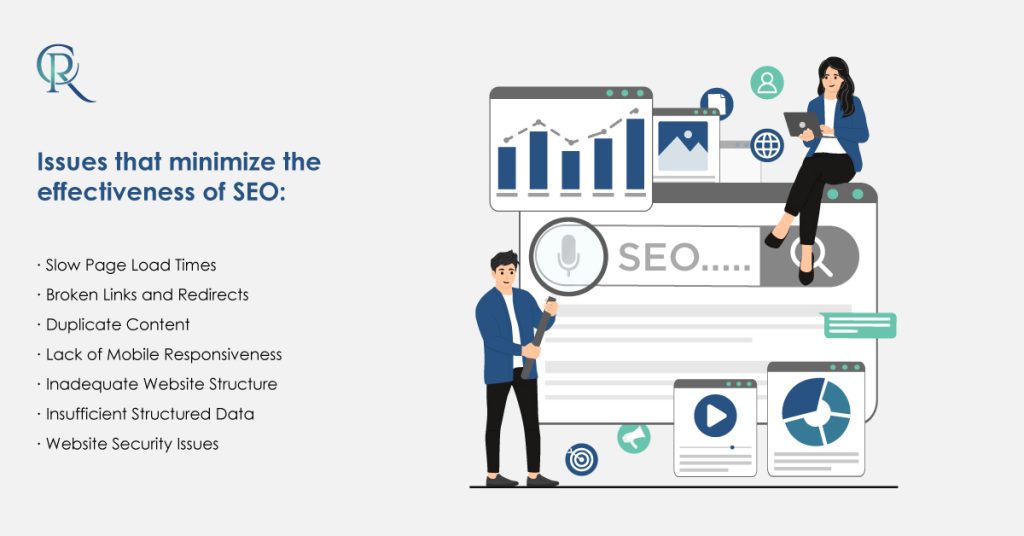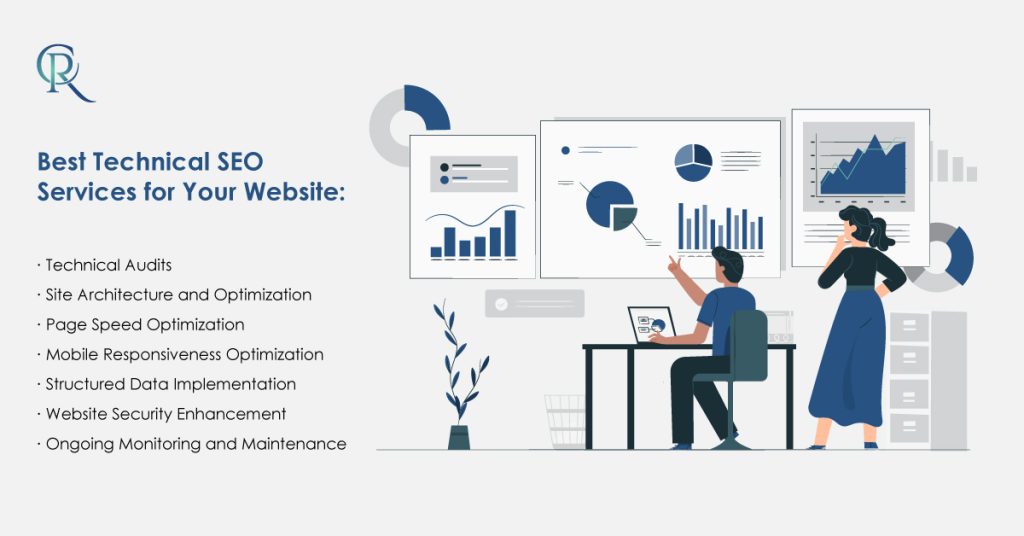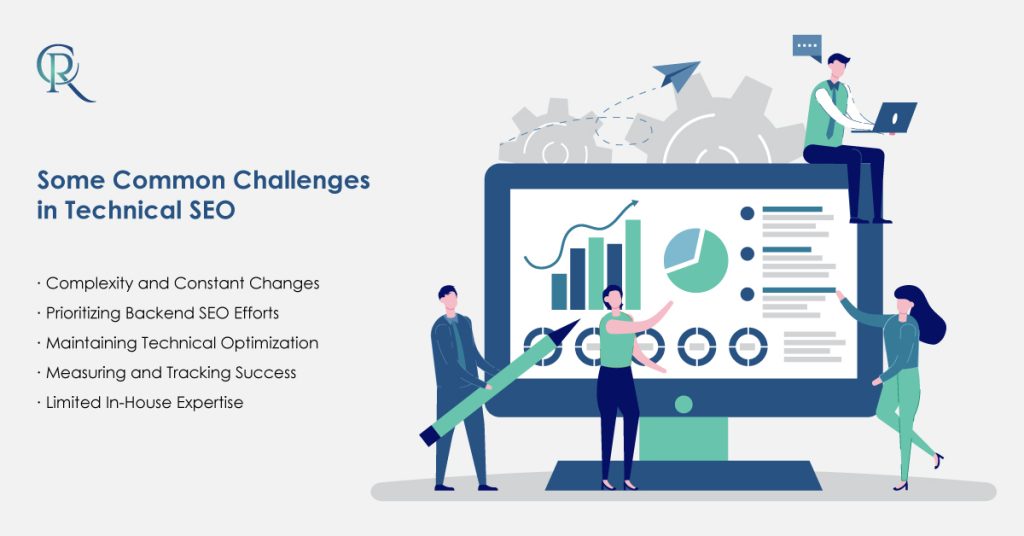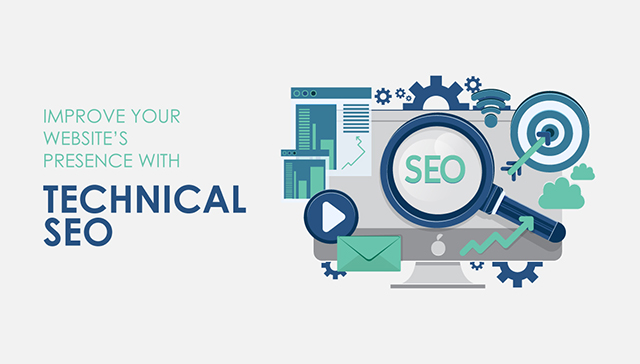SEO is an optimization approach that enhances a website’s visibility on search engines by focusing on keyword research, building backlinks, and content optimization. An effective SEO strategy includes On-page SEO, Off-page SEO, and Technical SEO (also known as seo technical or tech seo). Technical SEO improves organic search performance, user experience (UX), navigation, and overall site performance by addressing backend and infrastructure issues. Technical SEO services are crucial in any SEO plan because they improve site loading speed, secure connections (HTTPS), technical optimization of backend elements, crawlability, indexability, and mobile friendliness.
Technical SEO is the work that helps search engines crawl, understand, and index your website without issues. If your pages are hard to crawl or slow to load, even great content can struggle to rank.
Understanding Technical SEO
As the term suggests, Technical SEO deals with the technical issues and challenges of the website to create a structured website in order to enhance its appearance on the Search Engine Result Pages (SERPs). This process is often referred to as backend SEO or server side SEO. Technical SEO definition: Technical SEO is the process of improving your website’s technical setup so search engines can crawl, index, and rank your pages more easily. If someone asks “what does technical SEO mean,” it means making your website easy for Google to read and easy for visitors to use.
Understanding Technical SEO is crucial for optimizing a website’s backend to improve its search engine performance. It focuses on enhancing the site’s infrastructure to improve search engine crawling and indexing.
Key elements of technical SEO include:
- Ensuring clean site architecture and clear internal linking
- Improving page load speeds.
- Implementing secure HTTPS connections.
- Utilizing structured data for better search engine comprehension.
- Applying technical optimization best practices for long-term SEO performance
It also involves fixing broken links, avoiding duplicate content, and ensuring mobile-friendliness. By addressing these technical aspects, websites can achieve higher search engine rankings, provide a better user experience, and drive more organic traffic.
What Is Technical SEO in Digital Marketing?
What is technical SEO in digital marketing? It is the foundation that supports content marketing, SEO campaigns, and even paid ads because it improves site performance and search visibility. When pages load faster and index correctly, users stay longer, and conversions often improve.
Technical SEO marketing is not about writing ads. It is about improving your website’s technical health so your marketing efforts perform better.
Importance Of Technical SEO For Website Performance
In today’s competitive digital landscape, a solid technical foundation is crucial for website success. Search engines like Google emphasize technical factors in rankings. Neglecting technical optimization can lead to reduced visibility and even penalties.
By optimizing technical aspects, you can:
- Improve crawlability and indexability
- Enhance page speed and technical SEO performance
- Ensure website security
- Leverage structured data for better search listings
- Optimize for mobile responsiveness
These efforts help search engines navigate and understand your site, provide a smoother user experience, and meet key ranking criteria. Addressing these technical considerations positions your website for greater visibility, higher rankings, and increased organic traffic.

Common Technical Issues That Effect SEO
Various factors can cause technical issues on a website, ultimately impacting SEO performance. These issues can reduce visibility, confuse search engines, and increase bounce rates. Some common problems that hinder SEO results are:
- Slow Page Load Times: Slow page load times negatively affect user experience and search engine rankings.
- Broken Links and Redirects: Broken internal or external links, and improper redirects can impact crawling and indexing and frustrate users.
- Duplicate Content: Duplicate content can lead to penalties and weaken the site’s authority.
- Lack of proper technical optimization: Missing key backend fixes can block crawling, indexing, and performance improvements.
- Lack of Mobile Responsiveness: Websites that are not optimized for mobile devices can suffer from poor UX and lower rankings.
- Inadequate Website Structure: A poorly organized site can make it hard for search engines to crawl and index your content effectively.
- Insufficient Structured Data: Missing schema markup can limit enhanced search results.
- Website Security Issues: Websites without HTTPS or with malware risks can be penalized by search engines.
By performing technical audit optimization using a clear technical SEO checklist, you can improve seo technical health and visibility on SERPs. Fixing these issues is also a core part of seo technical analysis and evaluation.
How To Perform Technical SEO for Your Website?
Conducting a Technical Audit for Your Website
Performing a thorough technical SEO audit is essential for identifying and resolving issues that hinder rankings and traffic. Key steps include:
- Site Crawl and Analysis: Use crawler tools to examine page speed, broken links, duplicate tags, and redirects.
- Indexability and Crawlability Assessment: Ensure search engines can crawl and index key pages.
- Mobile Responsiveness Evaluation: Assess mobile-friendliness to ensure a seamless experience across all devices.
- Website Security Review: Verify HTTPS and address security vulnerabilities.
- Structured Data Audit: Ensure structured data is correct and matches page content.
- Performance and Speed Analysis: Measure and improve loading times and site performance.
- Competitor Analysis: Compare your technical SEO against competitors to find opportunities.
Conducting a comprehensive audit helps uncover technical issues and build a targeted action plan to improve search engine performance. A structured technical SEO checklist helps ensure no critical backend SEO issues are missed.
Google Technical SEO Checks (Fast List)
Google technical SEO becomes easier when you use Google’s tools to find real issues. Start with Google Search Console to review indexing, Core Web Vitals, mobile usability, and crawl errors.
Quick Google technical SEO checks:
- Indexing and Coverage reports (what is indexed and what is excluded)
- Sitemaps (submitted and processed correctly)
- Core Web Vitals (LCP, INP, CLS)
- Mobile Usability Issues
- Crawl errors (404, soft 404, 5xx)
These checks help you quickly spot technical SEO optimization issues and fix the highest-impact items first.
On-Page Technical SEO Best Practices
After identifying technical challenges, implement on-page technical optimization strategies to address them:
- Optimizing Page Speed: Use image compression, browser caching, and code minification.
- Improving Website Structure: Ensure clear navigation, internal linking, and clean URL structure.
- Implementing Responsive Design: Make your site mobile-friendly.
- Utilizing Structured Data Markup: Use schema.org for better content context.
- Optimizing HTML Elements: Format title tags, meta descriptions, headings, and alt text properly.
- Ensuring Website Security: Use HTTPS and keep your site malware-free.
- Monitoring and Addressing Crawl Errors: Regularly fix crawl and indexation issues.
These practices enhance visibility, rankings, and traffic.
Technical SEO Strategy and Implementation
A technical SEO strategy is the plan you follow to fix the biggest issues first, then improve long-term performance. Most sites should prioritize indexing issues, site speed, and mobile usability over smaller enhancements.
Technical SEO implementation means turning audit findings into real changes, such as updating templates, fixing redirects, improving server response times, and validating results in Google Search Console. This is where many sites fail because the audit exists, but the fixes never go live.
For SEO technical analysis and evaluation, compare pre- and post-data on index coverage, crawl errors, and Core Web Vitals.
Off-Page Technical SEO Strategies
While on-page technical SEO focuses on internal elements, off-page technical SEO addresses external and infrastructure factors that affect performance. Key strategies include:
- Website Hosting and Server Configuration: Use a reliable, high-performance server.
- CDN Implementation: Improve loading times with a Content Delivery Network (CDN).
- Backlink Profile Optimization: Maintain a healthy backlink profile and address toxic links.
- Robots.txt and Sitemap Management: Configure and maintain robots.txt files and XML sitemaps.
- Domain and URL Structure Optimization: Use clear URL structures and relevant keywords.
- Server-side SEO improvements for performance and reliability
Technical SEO Services and How They Can Help Your Website?
Server-side SEO can feel complex for businesses new to digital marketing. Professional technical SEO services can simplify the process and ensure consistent backend SEO improvements.
These services include:
- Technical SEO audits and technical SEO checklist implementation
- Technical Audits: Full assessments of your website’s technical architecture with clear recommendations.
- Site Architecture and Optimization: Improving site structure, URL structure, and navigation for crawlability and indexability.
- Page Speed Optimization: Image optimization, code minification, and server-side caching.
- Mobile Responsiveness Optimization: Better UX across all devices and screen sizes.
- Structured Data Implementation: Adding schema markup that matches your content.
- Website Security Enhancement: Secure protocols, vulnerability fixes, and malware prevention.
- Ongoing Monitoring and Maintenance: Continuous monitoring of technical performance and fixing new issues.

Overcoming Common Technical SEO Challenges
Technical optimization can improve rankings, but challenges still happen. Common challenges include:
- Complexity and Constant Change: Search engine algorithms evolve frequently. Staying updated helps reduce risk.
- Prioritizing Backend SEO Efforts: Technical SEO results may not be instant, so teams may ignore them. A plan and patience help.
- Maintaining Technical Optimization: Website changes, new pages, and new scripts can create fresh issues. Ongoing improvements are needed.
- Measuring and Tracking Success: The impact can be harder to measure than that of ads or content. Long-term tracking helps reveal results.
- Limited In-House Expertise: Technical tasks may require developers or specialists.
A proactive technical SEO strategy, regular audits, and technical SEO monitoring help maintain seo technical success over time.

Technical SEO Metrics and Monitoring
Technical SEO metrics show if your fixes worked. If you do not measure, you will not know what improved.
Technical SEO metrics to track:
- Core Web Vitals (LCP, INP, CLS)
- Index coverage (indexed vs excluded pages)
- Crawl errors (404, soft 404, 5xx)
- Crawl stats and server response behavior
- Page speed and real loading time
- Redirect chains and loops
- Duplicate tags and duplicate content patterns
Technical SEO monitoring involves regularly reviewing Google Search Console to catch new crawl errors, indexing drops, slow templates, and mobile usability warnings. This is a key part of SEO technical analysis because it identifies technical issues that degrade visibility over time.
What Is Technical SEO for Hotels? (Quick Example)
What is technical SEO for hotels? Hotel sites often use heavy images, booking widgets, and many similar pages (rooms, locations, amenities). That can create slow speed, duplicate URLs, and crawl issues.
Technical SEO for hotels usually focuses on:
- Speed improvements for room pages and galleries
- Crawl control for filters and URL parameters
- Structured data where relevant (hotel details, FAQs, reviews if valid)
- Keeping location pages indexable and well-linked
FAQs:
How can I implement technical SEO effectively to improve my website’s performance and rankings?
You can implement technical SEO effectively by following these steps:
- Conduct regular audits
- Optimize site speed
- Secure the site with HTTPS
- Ensure a mobile-friendly interface
- Build a clear site architecture with strong internal links
- Consistently monitor website status in Search Console
- Stay up-to-date on trends and updates
Why should I optimize my site technically?
You should optimize your site’s technical setup because it helps Google crawl and index your pages, improves speed and UX, and enhances security. This often leads to better rankings and more organic traffic.
What is the technical seo checklist?
A technical SEO checklist is a list of tasks used to improve crawlability, indexability, speed, mobile usability, security, and structured data. It helps ensure no important technical issues are missed during audits.
How to do an SEO audit for a client?
Start with a crawl, check indexing in Google Search Console, review Core Web Vitals, test mobile usability, inspect redirects and broken links, and review structured data. Then create a prioritized action plan with clear fixes and validation steps.
How can I track the Performance for Technical SEO?
Track technical SEO performance using metrics such as Core Web Vitals, crawl errors, index coverage, and page speed. Use technical SEO monitoring in Google Search Console to spot drops and fix issues quickly.
What is techincal SEO?
“Techincal” is a common misspelling of technical SEO. It means the same thing: improving your website’s backend and technical setup so search engines can crawl, index, and rank your pages more effectively.
Ending Remarks
Mastering technical SEO is essential for improving a website’s performance in today’s competitive digital era. It involves optimizing backend elements such as site structure, page speed, and security to improve visibility and the user experience. While challenges like algorithm updates and ongoing maintenance exist, a clear technical SEO strategy and consistent implementation can improve rankings and organic traffic.
By staying proactive, conducting regular audits, tracking technical SEO metrics, and following technical SEO monitoring routines, businesses can keep websites optimized for long-term success in search results.




